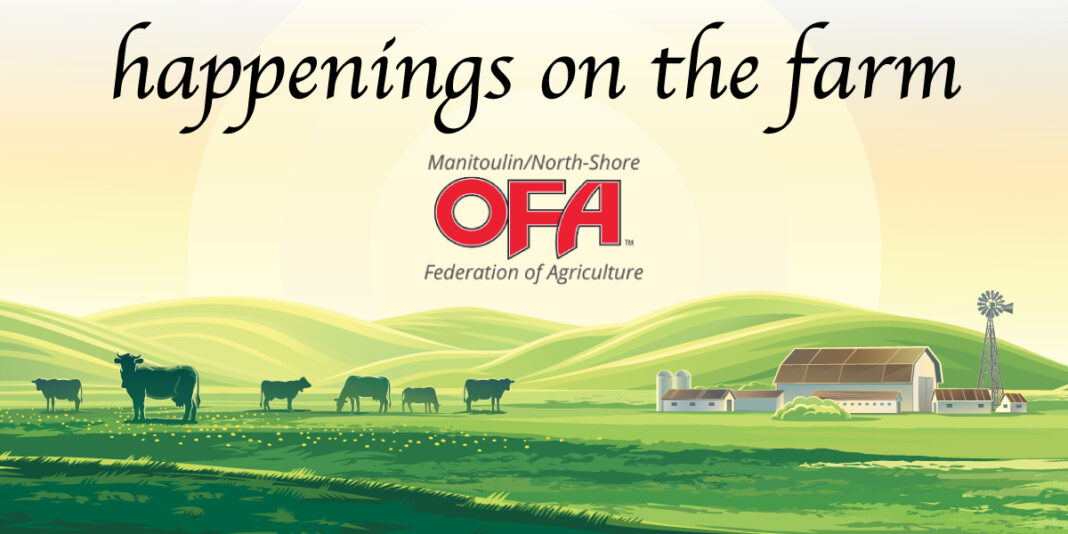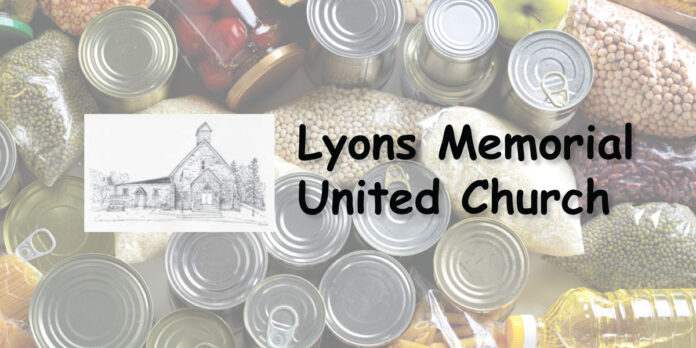UPDATED: Wednesday October 11 at 1:51 pm
EDITOR’S NOTE: This week’s edition of The Manitoulin Expositor will feature a new column, ‘Happenings on the Farm’ which will be submitted quarterly by the Manitoulin North Shore Federation of Agriculture (MNSFOA).
“We want to better inform people about farming,” said Bill Orford, who along with Mike Johnston, both of MNSFA, are introducing the new column. “And there are a lot of new people moving in and opening private gardens or buying farms. A lot has changed on Manitoulin Island in the past three years.”
“Our first column explains why farmers do certain things so that we can produce enough food for everyone,” said Mr. Johnston. “We are losing massive amounts of acres of farming property in Ontario every day. The land that remains will need to be more productive or we are going to have to rely on other countries for more of our food.”
“We hope our first column will help answer questions people may have,” said Mr. Orford. “We would like to publish a quarterly column in the newspaper, for the major seasons and provide information of what people are going to see in terms of our farming community.”
“We just want to get something off the ground to bring awareness to what we are doing and how we are producing the food we do,” said Mr. Orford. “If they are not comfortable or don’t understand what they are seeing, they can approach us,” said Mr. Johnston.
Below is a copy of the first column, “Happenings on the Farm.”
Ontario farmers grow over 200 commodities and the agri-food sector employs 12 percent of Ontario’s workforce. Here on Manitoulin Island, most of the farmland is used for cattle and pasture production, allowing for strong crop rotation and improved soil health. Manitoulin farms contribute $44 million in gross domestic product and employ over 650 people in the agri-food sector from farm to fork. Apart from the economic impact and the importance of agriculture in rural economic development, farming in Ontario also helps put food on people’s plate, both on the Island and across the province.
Our strong, sustainable agricultural sector in Canada also affords consumers the luxury of choice. Consumers can make food choices based not only on cost, but also based upon environmental concerns, health needs or ethics. These choices exist because there are farmers across Ontario and here on Manitoulin who rely on different ways to farm (conventional, organic, grass-fed, free-range, etc.), all of which produce food that is safe to eat.
An issue that often concerns the public is the use of pesticides on crops. Farmers who choose to use pesticides do so to make sure there is enough food for everyone, by protecting crops from insects, weeds, and fungal diseases.
Canada currently has one of the most stringent regulatory systems in the world for pesticide use. Within Ontario, farmers are required to be certified under the Grower Pesticide Safety course before they can use pesticides. Farmers take many things into consideration before using pesticides, and are stringent about how much they use and whether they use it. While pesticides have been used for many years, the efficiency and accuracy of pesticide applications continues to improve.
To remain healthy, we need to eat fresh fruits and vegetables. Whether produced conventionally or organically, these foods are safe to consume. And the farmer’s that produce these foods are proud to bring them to you.
Farming has changed significantly over the last few decades and will continue to do so. In Ontario, less than five percent of the land base can support food based agricultural production and much of the best farmland in the province is under threat of development. If we continue to lose arable land, we will need to further intensify agriculture so that we can continue to produce enough food for the people of this province. Farmland preservation on Manitoulin Island and across Ontario is important and we encourage everyone to share this message with their elected officials.
If you would like to learn more about Canadian agriculture, we would encourage you to check out the Real Dirt on Farming. If you would like to learn more or act on farmland preservation, please check out OFAs Home Grown campaign. As we continue to learn, change and improve our farming practices, we look forward to sharing some of that with you in this new series “Happenings on the Farm”.





